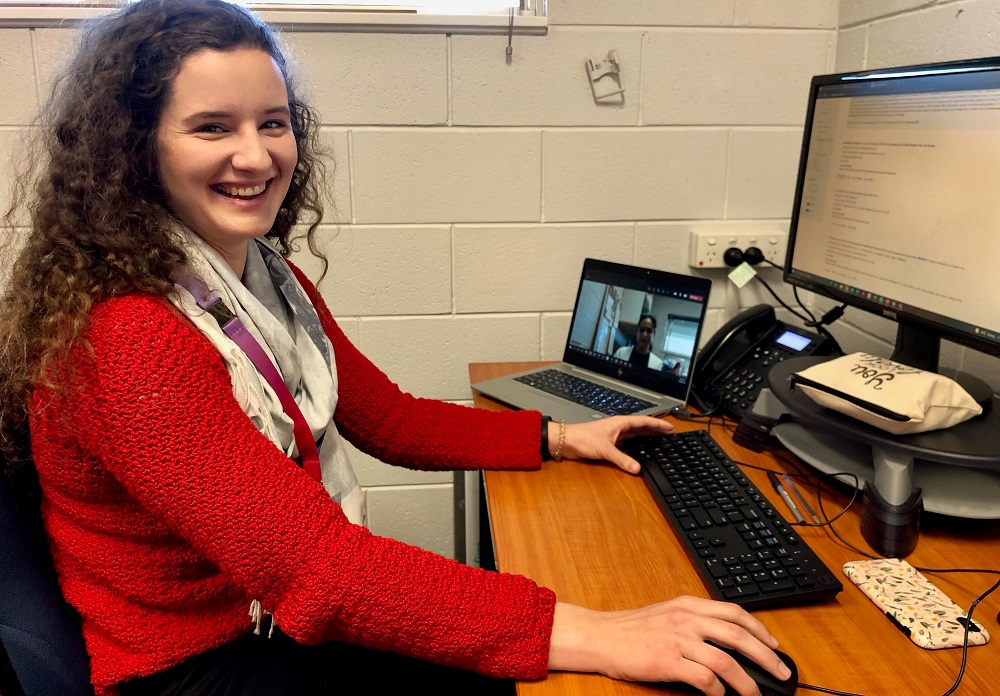As Rocky Bay’s Telepractice Research Project Coordinator, Cloe Benz’s expertise is more in demand than ever, with telepractice fast becoming popular among Rocky Bay customers.
Cloe’s research, which is part of her scholarship with Curtin University, funded by Research Office Curtin, delves into proactive and preventative health care for customers via digital platforms, also known as telepractice.
“Previously the only time health professionals used telepractice was to access people living in rural and remote areas. Country health services did that, but metropolitan health services did nothing like this; it was all very new,” Cloe said.
Rocky Bay’s current telepractice service, introduced in early 2020 in response to the COVID-19 pandemic, gives customers the option to choose how they access their therapy and health care.
Cloe works with our customers and clinicians to understand their experience of using telepractice. The research being undertaken will support Rocky Bay clinicians to best achieve the desired outcome of their customers.
Trained as a Physiotherapist, Cloe began her career in acute pediatric health care and began an initial research project for her Masters of Pediatric Physiotherapy Practice with Monash University. The project’s aim was to treat as many young patients as possible with a combination of virtual and face-to-face visits, instead of their families having to constantly travel to a hospital to receive services.
“In order to get the support of the medical teams who I was working with, I was able to start this project as long as I did some kind of research to assess whether or not it was effective,” Cloe said.
“I really wanted to make sure that this project, which I knew would benefit kids and keep them at home to access care, could support how beneficial digital intervention can be.”
Cloe submitted her research project on telepractice in acute health care in November 2019. She made the move to Perth from the East coast in February 2020, and in March that same year the COVID-19 pandemic hit Australia.
Suddenly telepractice research became extremely relevant, and the pandemic forced a change in general attitudes toward digital health care.
In 2020, Rocky Bay’s Clinical General Manager, Michelle Dillon, submitted a project proposal to Curtin University for a tele project opportunity at Rocky Bay.
With a passion for technology as an enabler of independence, and a love for working with those who embrace digital health, Cloe was offered the scholarship by Research Office Curtin and chose Rocky Bay’s project proposal, which would include three and a half years of research.
“With the experience I had in digital health, I looked at an opportunity that would be a challenge, but also somewhere where I genuinely felt I could add value. I didn’t know much about disability the sector, apart from my interactions from the health side of things, but everyone has been very welcoming since my arrival,” Cloe said.
Cloe said success in the research would be if her findings can secure a sustainable telepractice program offering at Rocky Bay in the long term.
“The best thing that could happen is that once I finish this project, I have made myself obsolete. That this program runs in Rocky Bay for years to come and benefits lots of different customers, giving them the choice of telepractice, and supporting our clinicians if that’s what our customer’s want.”
A Telepratice Steering Committee has been created at Rocky Bay, and with Cloe’s support, the team have developed a project plan outlining how telepractice can be designed to best fit customer’s needs.
Sitting on the Committee are ten members including Cloe, Michelle Dillon, a Rocky Bay customer, a representative from Rocky Bay’s Business Transformation Team, and Rocky Bay therapists and advanced clinicians from different therapy disciplines.
“Our goals as a Committee is to do research inclusively with our customers and for them,” Cloe said.
“We have a customer who sits on the committee, listens to everything we say and offers excellent feedback, as well as helping us to identify our own internal biases.
“The way we see the project eventually being set up is to incorporate as many perspectives as possible, and involve our customers in designing a telepractice program that works for them – something they would want to choose.”
The Committee hope to make the research more collaborative and approachable throughout every step of the project. This includes integrating customer perspectives, increasing awareness of the purpose of the research, and ensuring it can be incredibly useful and accessible for both customers and clinicians, giving choice and control to Rocky Bay customers regardless of where they live.
